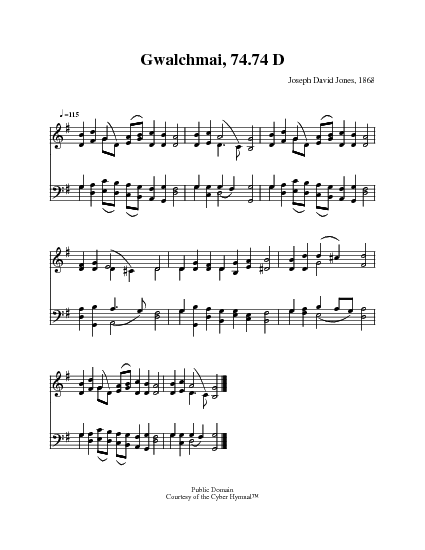- |
User Links
King of Glory, King of Peace

King of glory, King of peace
Author: George HerbertTune: GWALCHMAI
Published in 63 hymnals
Printable scores: PDF, MusicXMLAudio files: MIDI
Representative Text
1 King of glory, King of peace,
I will love Thee;
and that love may never cease,
I will move Thee.
Thou hast granted my request,
Thou hast heard me;
Thou didst note my working breast,
Thou hast spared me.
2 Wherefore with my utmost art
I will sing Thee,
and the cream of all my heart
I will bring Thee.
Though my sins against me cried,
Thou didst clear me;
and alone, when they replied,
Thou didst hear me.
3 Sev'n whole days, not one in sev'n,
I will praise Thee;
in my heart, though not in heav'n,
I can raise Thee.
Small it is, in this poor sort
to enroll Thee:
e'en eternity's too short
to extol Thee.
Source: Psalms and Hymns to the Living God #195
Author: George Herbert
 Herbert, George, M.A., the fifth son of Richard Herbert and Magdalen, the daughter of Sir Richard Newport, was born at his father's seat, Montgomery Castle, April 3, 1593. He was educated at Westminster School, and at Trinity College, Cambridge, graduating B.A. in 1611. On March 15, 1615, he became Major Fellow of the College, M.A. the same year, and in 1619 Orator for the University. Favoured by James I., intimate with Lord Bacon, Bishop Andrewes, and other men of influence, and encouraged in other ways, his hopes of Court preferment were somewhat bright until they were dispelled by the deaths of the Duke of Richmond, the Marquis of Hamilton, and then of King James himself. Retiring into Kent, he formed the resolution of taking Holy Orders… Go to person page >
Herbert, George, M.A., the fifth son of Richard Herbert and Magdalen, the daughter of Sir Richard Newport, was born at his father's seat, Montgomery Castle, April 3, 1593. He was educated at Westminster School, and at Trinity College, Cambridge, graduating B.A. in 1611. On March 15, 1615, he became Major Fellow of the College, M.A. the same year, and in 1619 Orator for the University. Favoured by James I., intimate with Lord Bacon, Bishop Andrewes, and other men of influence, and encouraged in other ways, his hopes of Court preferment were somewhat bright until they were dispelled by the deaths of the Duke of Richmond, the Marquis of Hamilton, and then of King James himself. Retiring into Kent, he formed the resolution of taking Holy Orders… Go to person page >Text Information
Related Texts
| First Line: | King of glory, King of peace |
| Title: | King of Glory, King of Peace |
| Author: | George Herbert |
| Meter: | 7.4.7.4 D |
| Language: | English |
| Copyright: | Public Domain |
- Year B, Ordinary Time, Proper 28 (33)
Related to 1 Samuel 1
Notes
King of glory, King of peace. G. Herbert. [Praise to God.] From his Temple, 1633, p. 140, in 7 stanzas of 4 lines and entitled "Praise." It is usually abbreviated as in The English Hymnal, 1906, the Hymn Book for the Use of Wellington College, 1902, &c.
--John Julian, Dictionary of Hymnology, New Supplement (1907)
Access an additional article on the Canterbury Dictionary of Hymnology:


 My Starred Hymns
My Starred Hymns


